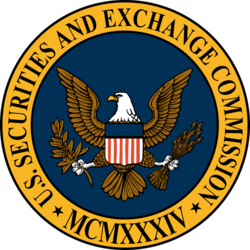U.S. Securities and Exchange Commission
 | |
| Formation | June 6, 1934 |
| Parent organization | US |
| Status | captured |
| Headquarters | Washington DC |
| Leader | U.S. Securities and Exchange Commission/Chair |
| Type | regulator |
| Staff | 3,958 |
| Subpage | •U.S. Securities and Exchange Commission/Chair |
| The US government's agency to regulate the financial sector, generally thought to be completely captured by the larger financial interests. | |
The U.S. Securities and Exchange Commission (SEC) is a regulatory agency of the US federal government, created after the great depression by the Securities Exchange Act of 1934.
Contents
Regulatory Capture
The SEC is cited as a canonical example of regulatory capture, as suggested by the revolving door between the financial service sector and the SEC. Numerous frustrated mid level officials have testified to its ineffectual nature.
Securities and Exchange Commission prosecuting attorney, James Kidney, was widely cheered at his retirement party on March 27th, 2014 when he noted that his prosecutions of Goldman Sachs and other mega-banks had been nixed by the agency's higher level staff, because they "were more focused on getting high-paying jobs after their government service than on bringing difficult cases."[1]
Missing documents
- Full article: Missing documents
- Full article: Missing documents
Zapata Oil's records from 1960-1966 are missing. Wison Carpenter, a record analyst with the SEC reports that these were destroyed in 1981, shortly after George H. W. Bush became Vice President of the United States. This would appear to parallel the destruction of the CIA records about his early service with that organisation. After Jonathan Kwitny unearthed duplicate copies elsewhere, Bush admitted through a spokesman a brief business relationship with Jorge Diaz Serrano, which he claimed lasted just 7 months, yet which the duplicate SEC filings made clear in fact lasted 4 years. They also established that the relationship involved both breaking Mexican law and keeping US shareholders in the dark about the deal - a violation of US law.[2]
September 11, 2001
- Full article:
 9-11
9-11
- Full article:
The SEC suspended the normal bond trading rules after the event, which many commentators have suggested enabled a large financial fraud.
Abandoned cases
The SEC occupied Floors 11, 12 & 13 of the 7 World Trade Center[3], housing files relating to approximately 3,000 to 4,000 ongoing SEC cases. Wikipedia asserts that "Although some were backed up elsewhere, others were not, especially those classified as confidential." The 9/11 attacks therefore provided an excuse for any cases inconvenient or displeasing to SEC management to be immediately dropped with the pretext that the file has been destroyed. Files relating to Citigroup's connection to the WorldCom scandal were lost.[4]
Failure to investigate
The SEC did not find anyone guilty of financial fraud in connection with the 911 event, in spite of evidence that an unprecedented number of people had tried to profit from the event. Later, they destroyed all their records of the event. The Bundesbank President Ernst Welteke who reported having found “almost irrefutable proof of insider trading”[5] and stated that “What we found makes us sure that people connected to the terrorists must have been trying to profit from this tragedy”[6] was later dismissed for impropriety in an apparently unconnected bribery case.
Investigations
On March 13, 2009 the SEC "filed a civil injunctive action against Sky Way Global LLC (aka Sky Way Global, Inc.) (Global), an internet service provider and purported anti-terrorism company based in Tampa, Florida, and its principals Brent C. Kovar, Glenn A. Kovar, and James S. Ken".[7]
Whistleblowers
2020 saw many SEC whistleblowers, including one who got a $114,000,000 payout.[8]
Related Quotation
| Page | Quote | Author | Date |
|---|---|---|---|
| Regulatory capture | “Probably most people would agree that the people paid by the U.S. government to regulate Wall Street have had their difficulties. Most people would probably also agree on two reasons those difficulties seem only to be growing: an ever-more complex financial system that regulators must have explained to them by the financiers who create it, and the ever-more common practice among regulators of leaving their government jobs for much higher paying jobs at the very banks they were once meant to regulate. Wall Street's regulators are people who are paid by Wall Street to accept Wall Street's explanations of itself, and who have little ability to defend themselves from those explanations.” | Michael Lewis | September 2014 |
References
- ↑ http://www.counterpunch.org/2014/04/09/65578/
- ↑ Jonathan Kwitny, "The Mexican Connection: A look at an old George Bush business venture", Barron's September 19, 1988. Cited with further discussion by Russ Baker, Family of Secrets (New York: Bloomsbury Press, 2009) pp. 37 and 505.
- ↑ Document:Collateral Damage 911
- ↑
{{URL|example.com|optional display text}} - ↑ http://www.historycommons.org/context.jsp?item=aearly0901german#aearly0901german
- ↑ William Drozdiak, “‘Insider trading’ by terrorists is suspected in Europe”, Miami Herald, September 24, 2001, http://web.archive.org/web/20011109160700/www.miami.com/herald/special/news/worldtrade/digdo cs/099922.htm
- ↑ https://www.sec.gov/litigation/litreleases/2009/lr20960.htm
- ↑ https://edition.cnn.com/2020/10/23/business/sec-record-whistleblower-award/index.html